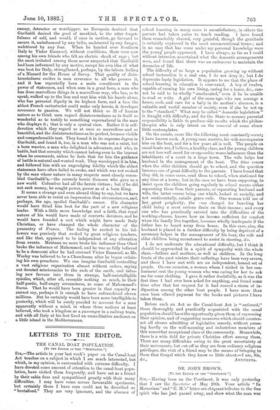LETTERS TO THE EDITOR.
THE CANAL BOAT POPULATION.
[To THE EDITOR OF 'THE "SPECTATOR.")
Sut,—The article in your last week's paper on the Canal-boat Act touches on a subject in which _I am much interested, but which, in my opinion, is surrounded with extreme difficulty. I have devoted some amount of attention to the canal-boat popu- lation, have visited them frequently, and have sat as a friend by their cabin fires and sympathised greatly with their many difficulties. I may have come across favourable specimens, but certainly those I have seen could not be described as "brutalised," They are very ignorant, and the absence of school learning in many cases is unsatisfactory, in others the parents had taken pains to teach reading. I have found them remarkably shrewd, very grateful, though the gratitude is certainly expressed in the most unconventional terms ; and in no case that has come under my personal knowledge were the young' people oppressed. I have always, as far as I could without intrusion, ascertained what the domestic arrangements were, and found that there was an endeavour to maintain the decencies of life.
The difficulty of so large a population growing up without school instruction is a real one, I do not deny it ; but I do deprecate hasty legislation. It appears to me that the place of school learning in education is over-rated. A boy of twelve, capable of earning his own living, caring for a horse, &c., can- not be said to be wholly "uneducated," even if he be unable to read or write. A girl of the same age, who can manage a house, cook, and care for a baby in its mother's absence, is a valuable and useful member of society, even if she be not up to the "standard.". What may be called " domestic legislation" is fraught with difficulty, and for the State to assume parental
responsibility is liable to produce-side results . which the philan- thropist who is only intent on the removal of some abuse little contemplates.
On the canals, cases like the following must constantly occur; I have known such. A young man marries, his wife accompanies him on the boat, and for a few years all is well. The people on canal-boats are, I believe, a healthy class, and the young children are not less well cared for or exposed to worse influences than the inhabitants of a court in a large town. The wife helps her husband in the management of the boat. The time comes when the elder children should go to school, and the question becomes one of great difficulty to the parents. I have found that they did, in some cases, send them to school, when stationed for any time at a town; but in the case we have been supposing, to insist upon the children going regularly to school means either separating them from their parents, or separating husband and wife, the latter course being one which, looked at socially, and not sentimentally, entails grave evils. One woman told me of her great perplexity, the :um charged for boarding her child being a most serious drain on their income ; and every one who has practically entered into the difficulties of the working-classes, knows how an income sufficient for comfort when the family live together, becomes wholly inadequate if the father has to board away from home. In this case, also, the husband is placed in a further difficulty by being deprived of a necessary helper in the management of his boat, the wife and elder children being accustomed to assist in steering, &c.
I do not underrate the educational difficulty, but I think it should be approached in a spirit of sympathy with the whole class,—fathers and mothers, as well as children. In the long frosts of the past winters their sufferings have been very severe, and those I have met with are an independent, honest set of people. On one occasion, a woman whom I visited in her con- finement sent the young woman who was caring for her to ask me for some clothing. I gave it rather doubtfully, as it was the first time I had ever been asked for anything, and found some time after that her request for it had roused a storm of in- dignation among the other boat people. I have more than once been offered payment for the books and pictures I have taken them.
Before such an Act as the Canal-boat Act is "enforced," those thoroughly and practically acquainted with the canal population should have the opportunity given them of expressing their opinion, and of suggesting measures which should counter- act all abuses admitting of legislative remedy, without press- ing hardly on the well-meaning and industrious members of this somewhat exceptional class of the community. Meanwhile, there is a wide field for private Christian effort among them.
There are many difficulties owing to the great uncertainty of their movements, but cut off as they are from ordinary religious privileges, the visit of a friend may be the means of bringing to them that Gospel which they know so little about. —I am, Sir,




































 Previous page
Previous page